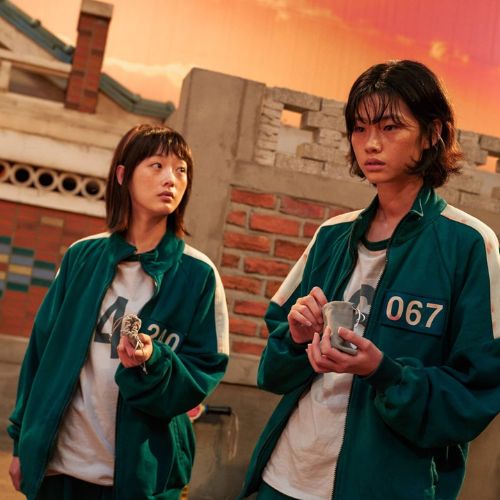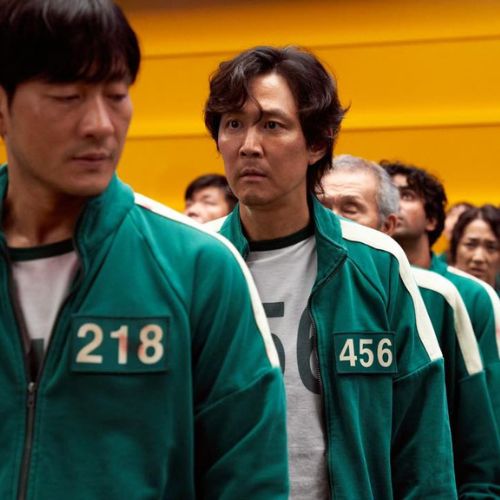3 years of Squid Game: Exploring 5 reasons behind Lee Jung Jae, Jung Ho Yeon starrer thriller’s explosive popularity
As the hit series Squid Game marks its third anniversary, let’s delve into the reasons behind the explosive popularity of this thriller, starring Lee Jung Jae, Jung Ho Yeon, and Wi Ha Joon.

Squid Game is a South Korean dystopian survival thriller created by Hwang Dong Hyuk for Netflix. The cast of the first season includes Lee Jung Jae, Park Hae Soo, Wi Ha Joon, Jung Ho Yeon, Anupam Tripathi, and others. Released worldwide on September 17, 2021, the series received widespread critical acclaim and quickly garnered international attention.
It became Netflix's most-watched series and topped the charts in 94 countries, attracting over 142 million households and accumulating 1.65 billion viewing hours in its first four weeks, surpassing Bridgerton as the platform's most-watched show. As the series turns 3 today let’s take a look at the top reasons why the series became globally popular.
Squid Game plot
The series that captivated audiences worldwide, Squid Game, centers on 456 participants who compete in a series of children’s games for a chance to win 45.6 billion won (approximately $40 million). Starring Lee Jung Jae, Park Hae Soo, Jung Ho Yeon, and Wi Ha Joon, the drama explores the intense and often deadly competition among players vying for the substantial prize money.
The story of Squid Game unfolds in a dystopian South Korea, where Seong Gi Hun (played by Lee Jung Jae), a divorced father burdened by debt and living with his elderly mother, is invited to participate in a series of children's games for a chance at a substantial cash prize. Upon accepting the offer, he is transported to a secret location, where he joins 455 other players, all of whom are in dire financial situations.
The players are dressed in green tracksuits and monitored at all times by masked guards in pink jumpsuits, with the games overseen by the enigmatic Front Man, who wears a black mask and uniform. It quickly becomes apparent that losing a game means death, with each death adding 100 million won to the potential 45.6 billion won grand prize.
Gi Hun forms alliances with fellow players, including his childhood friend Cho Sang Woo (Park Hae Soo) and North Korean defector Kang Sae Byeok (Jung Ho Yeon), as they navigate the physical and psychological challenges of the games. Meanwhile, detective Hwang Jun Ho (Wi Ha Joon) infiltrates the games as one of the guards in a quest to find his missing brother.
How it became a global hit
Squid Game has garnered numerous accolades, including the Golden Globe Award for Best Supporting Actor – Series, Miniseries, or Television Film for O Yeong Su. Additionally, the Screen Actors Guild Awards recognized Lee Jung Jae and Jung Ho Yeon with Outstanding Performance by a Male Actor in a Drama Series and Outstanding Performance by a Female Actor in a Drama Series, respectively—marking the first time Korean actors won in these categories.
The first season of Squid Game received 14 Primetime Emmy Award nominations, including Outstanding Drama Series, making it the first non-English-language series to be nominated in this category. Lee Jung Jae won the award for Outstanding Lead Actor in a Drama Series, a historic win as the first Asian actor to receive this honor for a non-English role. With the series celebrating turning 3 as well as gearing up to release seasons 2 and 3; let’s take a look at the top reasons why it became a global hit.
1. Bizzare concept
The concept of Squid Game isn't entirely new, as it draws on the survival game genre where players must fight—and sometimes kill—each other to survive, a concept also seen in the global phenomenon The Hunger Games. However, Squid Game distinguishes itself by deeply exploring the personal backgrounds and emotions of its players, tracking their journeys from their entry into the game to their ultimate fate.
In Squid Game, participants are brought together to compete in children's games with a deadly twist: losing a game results in death, while the sole survivor takes home an unimaginable fortune. The series adds a unique layer by emphasizing the brutality of the elimination process, where losing means facing a grim fate.
A fundamental rule of the game is ensuring fairness, with candidates selected largely based on their desperate need for money. However, some participants, like Ji Yeong (played by Lee Yoo Mi), have personal reasons beyond financial need, adding layers of mystery to the selection process. Viewers can approach the series with various interpretations, exploring its deeper themes and emotional undertones which makes the concept bizarre yet engaging.

2. A reflection of society
At its core, Squid Game taps into a long-standing fascination with gamifying survival, where losing means facing horrifying and inhumane deaths—all under the watchful eyes of wealthy spectators indulging in sadistic pleasure. The series serves as a powerful commentary on the crushing economic inequality and financial instability faced by lower-income individuals, issues that have been further intensified by the global pandemic. It resonates with viewers who feel like they are not part of the ruling class but rather the underdogs or the marginalized, highlighting the stark divide between the privileged and those struggling to survive.
Desperation is the key motivator for the participants in Squid Game. Although they have the option to leave the game at the outset, all of them ultimately choose to return, recognizing that the harsh reality of poverty and the lack of viable escape from financial hardship may be more daunting than risking death for a life-changing prize. From this perspective, the brutality of the games becomes almost secondary. The series underscores the extent to which these individuals are willing to go, illustrating that they would rather endure extreme violence or the threat of it than continue to face the oppressive system outside the game.
This social commentary resonates deeply with viewers, but it is the horrific format of the games that adds to Squid Game's compelling allure. The contrast between the innocence of childhood games and the grim reality of the deadly stakes creates a sense of disattachment. This unsettling juxtaposition heightens the horror and intensifies the sense of powerlessness viewers experience as they watch, making the series both captivating and profoundly disturbing.
3. Relatable characters
As Squid Game progresses, the moral dilemmas faced by the characters become increasingly complex, prompting viewers to reflect on how they might respond in similarly distressing situations. The show’s appeal also stems from a sense of hope: witnessing contestants navigate their brutal trials and emerge victorious, as well as enduring the intense emotional journey of watching the series, can offer a sense of resilience. This, in turn, can make our own personal struggles seem more manageable and surmountable.
The series reveals humanity at its most harrowing, yet amidst the darkness, there are glimmers of light. Certain characters in the series are capable of touching even the coldest of hearts. Through masterful direction, expert writing, and vibrant performances, the show makes it nearly impossible not to care deeply about the contestants in this high-stakes game of survival.
Each character in Squid Game is portrayed in a way that underscores their humanity. Take Seong Gi Hun, for example: a man estranged from his wife and child, burdened by an elderly mother and financial ruin. His desperation for money makes his decision to enter the games all too understandable. Similarly, Han Mi Nyeo (played by Kim Joo Ryoung), despite being one of the more hated characters, displays a raw survival instinct that highlights another facet of human nature—self-preservation at any cost.
The series explores the full spectrum of human behavior, whether it leans towards good or evil. Some characters may act in ways we might not personally agree with, but their motivations and actions resonate with our understanding of human nature. This nuanced portrayal of characters, with all their complexities and contradictions, is what makes the series so compelling and relatable.

4. Thrills Thrills Thrills
This dynamic is evident in Squid Game through the interaction between the VIPs and the competitors, but it also extends to the viewers themselves on a meta level. Watching the series provides a safe way to experience the adrenaline rush that participants feel. Just as the VIPs observe Gi Hun and the other players from their luxurious vantage points, viewers watch the drama unfold from the comfort of their own homes. This setup allows us to experience the thrill and tension of the game without actually participating firsthand, offering an exhilarating yet safe way to engage with the intense emotions of the series.

5. Emotional impact
The compelling allure of Squid Game lies in how its main characters, like Seong Gi Hun, convey genuine emotions amidst the harsh cruelty of their dystopian world. This remarkable feat of acting resonates deeply with viewers, even those watching dubbed versions. While the series captivates with its relentless tension, violence, and extreme challenges, it also offers moments of humanity through the characters’ struggles and small acts of kindness.
In fiction, death represents an emotional rather than a physical threat. Yet, viewers experience real fear and stress, as the story triggers physical responses such as adrenaline release and heightened activity in the amygdala. The resolution of the story then activates the dopaminergic reward systems, providing psychological relief by symbolically confronting and surviving death. This process allows viewers to gain a sense of triumph and emotional release, enhancing the overall impact of the series.





 JOIN OUR WHATSAPP CHANNEL
JOIN OUR WHATSAPP CHANNEL









































